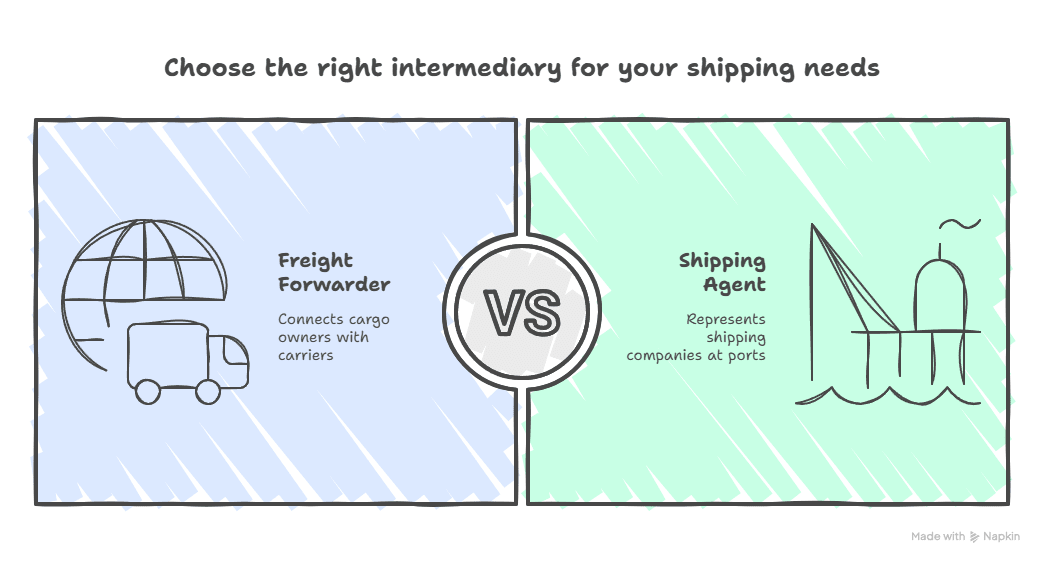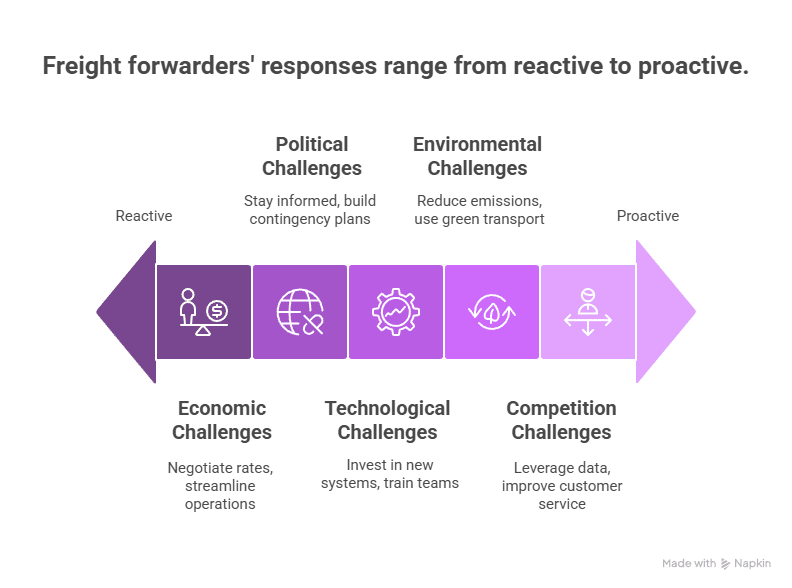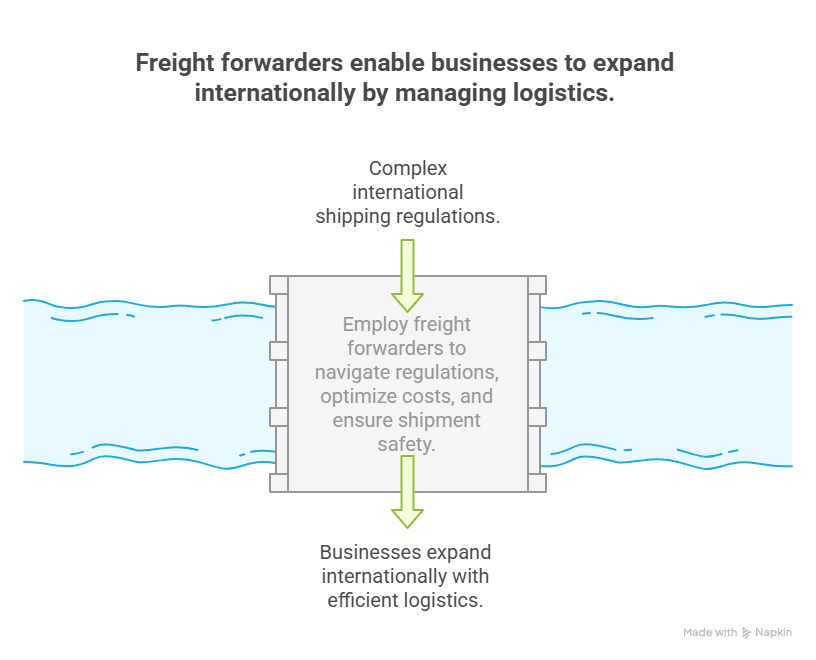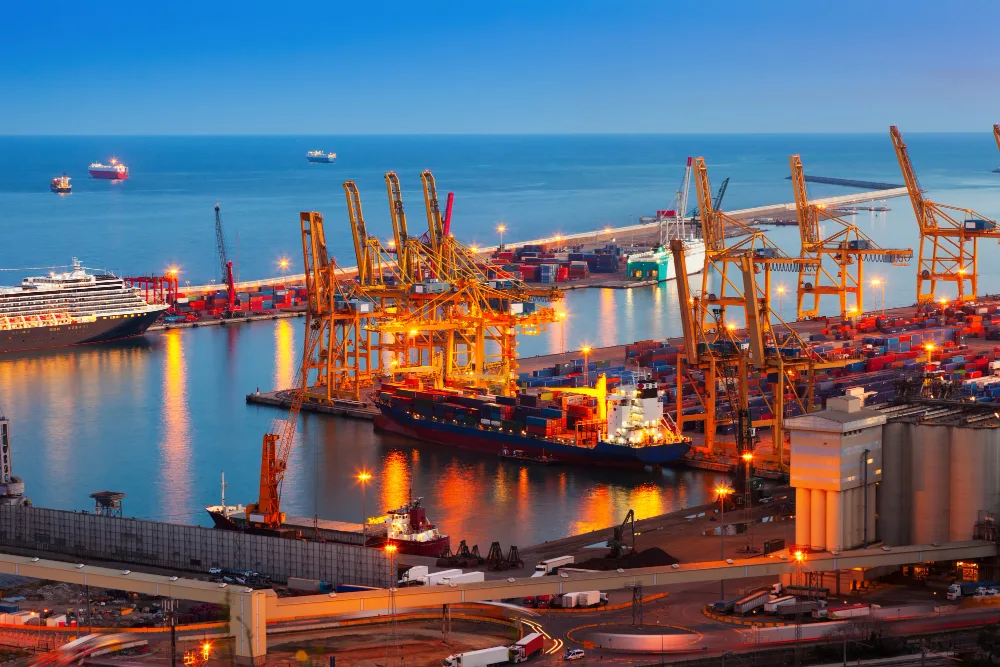New to global shipping? This guide on freight forwarding for beginners simplifies the whole process, what it is, how it works, and why it matters. You’ll get a clear picture of how goods travel across borders and what freight forwarders do to keep things running smoothly.
- What is the History of Freight forwarding ?
- What are the types of freight forwarding licenses?
- Freight Forwarder vs. Shipping Agent
- Frequent Difficulties Freight Forwarders Face (and How They Solve Them)
- 1. Economic Challenges
- 2. Political Challenges
- 3. Technological Challenges
- 4. Environmental Challenges
- 5. Competition Challenges
- 6. Automation and AI-Driven Decision Making
- 7. Integration with Other Digital Tools
- Why Freight Forwarding Matters Today
- Saving Money on Shipping
- Following Rules Properly
- Keeping Shipments Safe
- Conclusion
What is the History of Freight forwarding ?
Moving stuff from one place to another is really important. If we couldn’t send things safely from one city or country to another, the world wouldn’t run properly.
Like many things today, the freight business is also changing because of new technology.
Now, let’s look at how it all began. A long time ago, around the late 1700s, the first freight forwarders were people who owned inns. They helped their guests by keeping their things safe and sending them where they needed to go.
Soon, some business-minded people saw a good chance to turn this into a real job. In London, a company called Thomas Meadows and Company started helping shop owners and factory people move their goods. They worked with transport workers and helped with papers and customs too.
In the 1800s and 1900s, this kind of work became even more important. Factories began making a lot of items in one place. But to sell them, they had to send them to people who lived far away. So, moving goods safely became a big deal. It’s a big part of how businesses run today.
What are the types of freight forwarding licenses?
Before jumping into global trade, it helps to read up on freight forwarding for beginners. These resources explain who handles what, how cargo gets cleared at customs, and what to expect in terms of cost, time, and paperwork. Learning the basics of freight forwarding can be helpful.
Not every freight forwarder does the same thing. Some handle regular goods, while others deal with special stuff like medical machines or dangerous materials. That’s why they need different licenses depending on what they’re shipping.
If someone ships goods across borders, they need a customs expert. Customs brokers help make sure everything follows the rules, so things don’t get stuck or cause fines. For moving goods from one country to another, a freight forwarder’s license is also needed. It proves they know how to deal with paperwork, choose transport, and manage the full trip.
Now here’s how the shipping process usually goes:
First, the forwarder talks with the customer to understand what needs to be shipped. They plan how to do it—like which route is best and what kind of transport to use.
Then, they give a price and book space on the ship, plane, or truck. Once that’s done, they start preparing the papers. These include the forms needed for customs and documents showing what’s being shipped.
The seller sends the goods to the forwarder’s warehouse. Some forwarders even have their own trucks to pick things up directly.
Next, the forwarder takes care of customs. They make sure the shipment follows all rules, and they pay the required fees or taxes.
The goods are then sent to their destination, and the forwarder keeps track of everything on the way. If the shipment needs to stop somewhere for a while, they arrange storage.
When it reaches the final place, they deliver it to the buyer. And even after the delivery, they’re there to help—like if something was damaged or if a report is needed.
These are the fundamentals of freight forwarding.
Freight Forwarder vs. Shipping Agent

Freight forwarder: It is the link between the cargo owner and the carrier for domestic and foreign traders, factories and cargo owners.
shipping agent: It serves the shipping company and is the bridge between the shipping company or carrier and the port.
Shipping corporations handle the physical transportation of equipment, while freight forwarders provide logistics and documentation services. The choice between them relies on facets like cargo size, desired control level, and shipping complexity.
Frequent Difficulties Freight Forwarders Face (and How They Solve Them)

The concept of freight forwarding for beginners might seem overwhelming at first. Understanding the fundamentals of fright forwarding is important. That’s why we have broken down the entire process, along with the frequent difficulties they face.
1. Economic Challenges
Freight forwarders often face global economic fluctuations that affect demand. To stay profitable, they negotiate better supplier rates, streamline operations, use efficient transport methods, and adopt just-in-time systems—focusing on customer loyalty to ensure stability during uncertain times.
2. Political Challenges
Trade policies, tariffs, and geopolitical conflicts can disrupt operations. Freight forwarders respond by staying informed, engaging with industry associations, building contingency plans, and diversifying markets. These actions reduce dependence on any one region and cushion against political uncertainties.
3. Technological Challenges
Constant technological evolution demands freight forwarders to stay updated. They invest in new systems, train teams, and adopt digital tools for real-time tracking, automation, and analytics—ensuring they remain competitive, improve service quality, and meet modern logistics expectations.
4. Environmental Challenges
Sustainability is a growing concern in freight forwarding. Companies now focus on reducing emissions, using eco-friendly packaging, and choosing green transport options. They also implement energy-efficient warehousing practices to minimize environmental impact and align with global climate commitments.
5. Competition Challenges
Digital disruptors and tech-driven logistics firms intensify competition. Freight forwarders counter this by leveraging data, improving customer service, embracing automation, and offering flexible, value-driven solutions, ensuring they remain relevant and competitive in a rapidly evolving supply chain industry.
6. Automation and AI-Driven Decision Making
Logistics is now using smart tech and automation to make work faster. But many old-school freight forwarders still do things by hand—like calculating rates or planning routes—which takes more time and can lead to mistakes.
7. Integration with Other Digital Tools
Today’s businesses use many online tools to run things smoothly. But old-style freight forwarders usually work separately, which makes it hard to connect their work with these digital systems.
You have now learned about the basics of freight forwarding.
Why Freight Forwarding Matters Today

Freight forwarders make it easier to send things between countries. They know the rules, plan the best way to move stuff, and talk to shipping companies to get things done right. They also help with customs, papers, and insurance. Because of them, businesses can sell in other places without getting stuck with shipping problems.
Saving Money on Shipping
Freight forwarders help companies spend less on moving goods. They know many transport services and can get better prices. They also put small shipments together to save space and money. On top of that, they check how things move and find better ways to fix delays and save time.
Following Rules Properly
Sending goods overseas means following lots of rules. Freight forwarders understand these rules and help companies do things right. They take care of customs papers, checks, and special permits. Because they know the rules in each country, they help avoid mistakes, fines, and hold-ups.
Keeping Shipments Safe
Freight forwarders help keep things safe while they’re being shipped. They guide businesses on what kind of insurance is needed. If something gets lost or broken, they help with getting the money back. They also suggest ways to stop theft or problems during travel. If something unexpected happens—like a storm or strike—they already have a backup plan to keep things moving.
Conclusion
Many small businesses don’t know where to start when it comes to shipping globally. That’s why our guide on freight forwarding for beginners could be helpful to you. Now you learned the basics of freight forwarding.
Freight forwarders stay in the background, but their job really matters. They make sure things get shipped safely, help companies spend less, and handle all the tricky parts like customs and paperwork. Because of them, businesses can grow and send their products to more places without much stress. They quietly keep trade moving, one shipment at a time. That’s exactly what Triroute Shipping, a trusted shipping company in Dubai, UAE, does every day.
To learn more about Freight Forwarding, explore our related blog articles!
- The Ultimate Guide to Freight Forwarding
- What is Freight Forwarding?
- How Freight Forwarders Work on Simplify Global Shipping
- How Freight Forwarders Help Businesses Grow
- What are the benefits of freight forwarding?
- Choosing the Right Freight Forwarder
- Top Freight Forwarders in the Region
- The Future of Freight Forwarding






